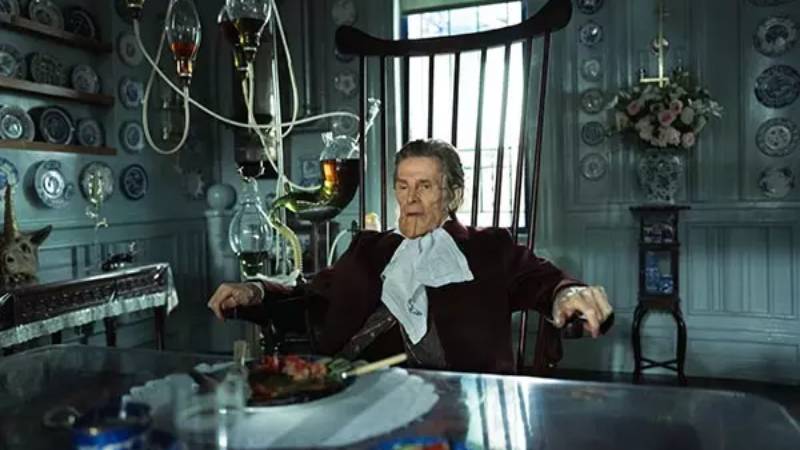




Socialist revolutionary Rosa Luxemburg once noted: “ Freedom is always and exclusively freedom for the one who thinks differently.” It’s easy to imagine Bella Baxter, the heroine of Poor Things, reading those words. A fictitious contemporary of Luxemburg, her peculiar tale comprises the 1992 novel by the Scottish nationalist Alasdair Gray. Thirty years later, Gray’s postmodern bildungsroman has finally been adapted into a feature film by Yorgos Lanthimos and Tony McNamara, the director-writer team behind The Favourite (2018). With Lanthimos’s flair for corporeal grotesquerie, this visually striking interpretation of Gray’s text pares back the novel’s complexity to hone on the Greek Weird Wave auteur’s fascination with the human body as a site for potential, perpetual transgression.
Bella’s (Emma Stone) story begins with another’s ending as a pregnant woman leaps from a bridge to her watery death. That woman is revived by the alchemical machinations of Dr. Godwin Baxter (Willem Dafoe), who surgically replaces her brain with her unborn child’s. Baxter enlists the services of a young colleague, Max McCandless (Ramy Youssef), to assist him in observing the woman he’s christened Bella as her cognitive abilities and sexual curiosities rapidly develop.
At the behest of the benevolent father figure she calls “God”, Bella is engaged to marry the meekly inoffensive McCandless and reside in the Baxter estate. But she’s wooed by the lascivious lawyer finalising the marriage, Duncan Wedderburn (Mark Ruffalo), and before long, Bella embarks on a whirlwind adventure with Wedderburn for her benefit more than his. The sights Bella absorbs, lensed in vibrant ektachrome by cinematographer Robbie Ryan, initially captivate her, but gradually revisit the opening scenes’ monochromatic palette as she strives to retain her compassion with every form of opportunism and cruelty she encounters.
The narrative beats of Gray’s novel are replicated in McNamara’s script, though its epistolary passages are understandably streamlined as Bella makes her way from Lisbon to Paris, daring Wedderburn to keep up. Lanthimos’s fascination with awkward expressions of human movement has persevered in his transition to the outer fringes of the mainstream. He has found his platonic ideal in Stone. With fearless physicality, her performance warrants a co-author credit in her contribution to shaping Bella’s transition from farcical naivete to self-assured perspicacity.

Yet despite my admiration for Stone, there are a slew of creative decisions in Poor Things that stymie the radical potential of its central character. Lanthimos visually emulates Bella’s awe at a world beyond any constraints of realism with the production design duo (Shona Heath and James Price) freely fusing Albert Robida’s futuristic illustrations with the buxom architecture in Fassbinder’s Querelle. Robida’s career was effectively ended by WW1, his fantastic machinery having lost their lustre in the face of mass carnage. The Great War ends Gray’s novel, yet it goes unmentioned in the film, which opts for a rare happy ending in Lanthimos’ oeuvre.
However, the parting note of emancipatory joy in Poor Things rings hollow. The sights of systemic inequity which shake Bella resemble those from the book, significantly a sojourn to Alexandria that yields her first exposure to squalor and despair. But it’s telling that while the film bluntly allegorises a gap between the higher and lower classes, McNamara and Lanthimos lack Gray’s interest in interrogating the social or psychological apparatuses which uphold that disparity.
Instead, Lanthimos’ jettisons specificity for a “universal” approach that too often mistakes vulgarity for transgression. The much-ballyhooed sex scenes do yield fleetingly pithy observations on the body as a site for pedagogical growth, but their outrageous lunacy plays too often to the peanut gallery. This faux-provocative attitude is bolstered by McNamara’s odious use of anachronistic swearing to get an easy laugh. “Hope is smashable, realism is not,” a cynical figure (Jerrod Carmichael) tells Bella. But Lanthimos’ inability to explore the complex methods of maintaining political hope belies his progressive overtures.
The result is a postmodern exercise in packaging history as a spectacular singularity, however fearful of pushing its audience to look beyond their own bodies. To that end, Poor Things is a film whose remarkably bold central performance is left to wallow in a secretly feeble movie.
Poor Things showed at the 61st New York Film Festival, when this piece was originally written. It premiered in September in Venice, where it won the Golden Lion. The UK premiere takes place in October, as part of the BFI London Film Festival. It also shows in the Best of Festivals section of the Tallinn Black Nights Film Festival. In cinemas on Friday, January 12th.





















